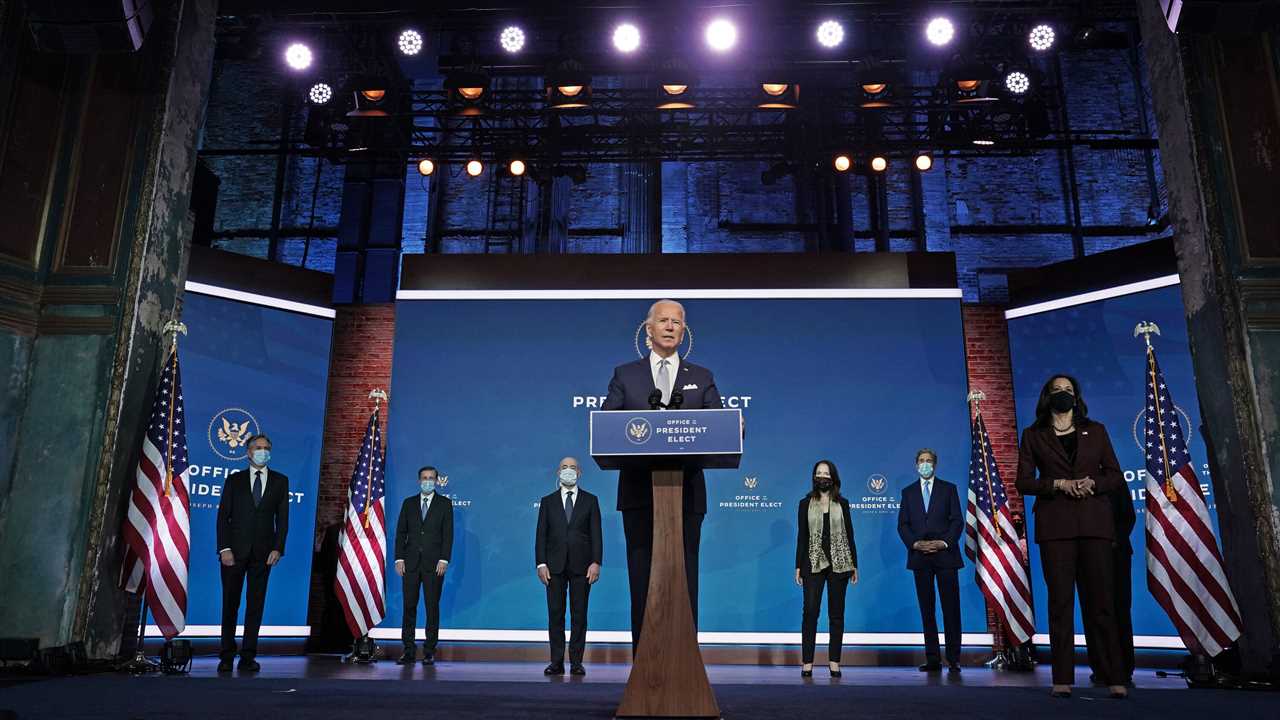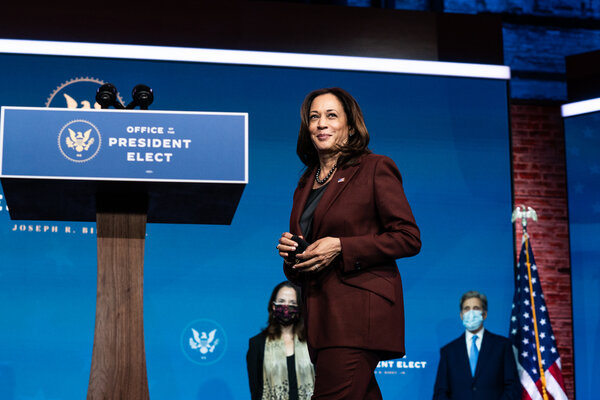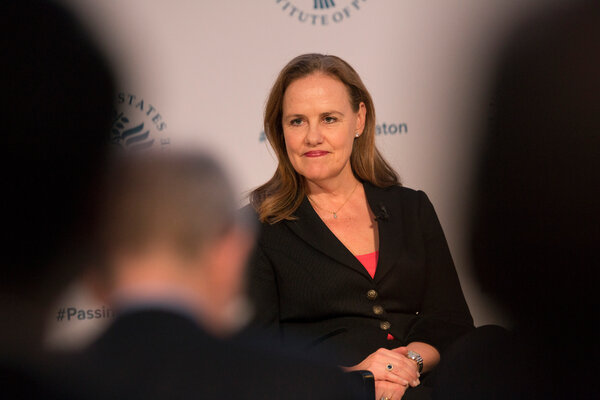
WILMINGTON, Del. — President-elect Joseph R. Biden Jr. formally introduced a national security team on Tuesday custom designed to repudiate President Trump’s nationalistic isolationism.
His nominee for secretary of state said in his remarks that Americans needed the “humility and confidence” to depend on allies. His choice to execute the nation’s immigration policy is a Cuban-American whose parents were refugees from Castro. And his new intelligence chief warned Mr. Biden when she spoke that she would bring him news that would be politically “inconvenient or difficult.”
They were joined by a career Foreign Service officer who will serve as ambassador to the United Nations and John Kerry, who ran for president unsuccessfully 16 years ago and then became President Barack Obama’s secretary of state. Mr. Biden appointed him to a new role inside the National Security Council to put “climate change on the agenda in the Situation Room,” after four years in which the Trump administration tried to have the words struck from summit communiqués and international agreements.
But it was in Avril Haines’s paean to the intelligence community — which Mr. Trump often regarded as a group of “deep state” renegades who wrongly tied him to Russia — that the contrast with the outgoing administration became clear. “To our intelligence professionals, the work you do — oftentimes under the most austere conditions imaginable — is just indispensable,” said Ms. Haines, who would be the first woman to serve as director of national intelligence, overseeing 16 separate agencies.
Mr. Biden has hardly created a team of rivals. Many of his nominees have worked together for years and as the “deputies” in the Obama administration who ran the gears of government at the White House, the State Department and the C.I.A. That also includes the Department of Homeland Security, where Alejandro N. Mayorkas, who will oversee immigration policy, had served as deputy secretary before Mr. Biden named him to lead the department.
Several are close friends. And most would be considered “liberal interventionists” who led the charge against Mr. Trump’s dismissal of America’s traditional role as the keystone in both Atlantic and Pacific alliances.
It all gave the Tuesday announcement at Mr. Biden’s headquarters in Wilmington the air of a restoration, or at least a class reunion.
Yet in his comments, Mr. Biden also seemed to acknowledge that the dangers his team would confront were starkly different from the ones they dealt with during the Obama presidency. “While this team has unmatched experience and accomplishments, they also reflect the idea that we cannot meet these challenges with old thinking and unchanged habits,” he said.
Mr. Biden talked about the need for “fresh thinking.” But achieving that balance will be his biggest challenge, both his own aides and outside experts have noted.

“His presidency may be the establishment’s last, best chance to demonstrate that liberal internationalism is a superior strategy to populist nationalism,” Thomas Wright, the Brookings Institution foreign policy scholar, wrote in The Atlantic recently.
That means resolving a subtle but clear debate within the Democratic establishment, one on which Mr. Biden has not yet chosen sides. It boils down to whether Mr. Biden should pursue the kind of foreign policy one might have expected in an Obama “third term” — one marked by caution, repairing alliances and an avoidance of talk of new Cold Wars — or one that pursues new, more confrontational paths in recognition of how much global competition has changed over the past four years, starting with China.
Jake Sullivan, Mr. Biden’s 43-year-old choice for national security adviser, whom Mr. Biden also introduced, has come to embody the new thinking the president-elect referred to. “He is a once-in-a-generation intellect with the experience and temperament for one of the toughest jobs in the world,” he said, noting that when he was in his 30s Mr. Sullivan conducted the talks that led to a cease-fire in Gaza in 2012 and the secret opening of negotiations with Iran that led to the 2015 nuclear deal.
It is Mr. Sullivan who has argued most vociferously for new approaches to China that recognize the changed nature of the challenge. And some of the appointees who shared the stage in Delaware with Mr. Biden and Vice President-elect Kamala Harris have made clear in recent times that they have regrets from the Obama years.
Those regrets include underreacting to the plight of Syrians being attacked by their own government, not recognizing the scope of Russia’s interference in the 2016 election until it was too late and moving too slowly in responding to the China challenge.
“Any of us, and I start with myself, who had any responsibility for our Syria policy in the last administration has to acknowledge that we failed,” Antony J. Blinken, the nominee for secretary of state, said in May, in one of the starkest of those admissions. “We failed to prevent a horrific loss of life,” he said. “It is something I will take with me for the rest of my days.” He went on to criticize Mr. Trump for pulling American troops out of Syria, and making the problem “arguably even worse.”
Conspicuously missing from the stage in Wilmington was one major player who is likely to have the biggest voice in the next Syria debate: Mr. Biden’s choice for defense secretary. He has not named one yet, though the leading candidate is believed to be Michèle A. Flournoy, who served as the under secretary of defense for policy under Mr. Obama and, in the Trump years, created a foreign policy advisory firm with Mr. Blinken, WestExec Advisors.

Ms. Flournoy, who has served in many senior roles in the Pentagon and was a co-founder of the Center for a New American Security, could be named next week, alongside Janet L. Yellen, the former chair of the Federal Reserve, who is widely reported to be Mr. Biden’s choice for Treasury secretary. If selected and confirmed, Ms. Flournoy and Ms. Yellen would be the first woman in either role.
Like Mr. Blinken, Ms. Flournoy has tended toward a more interventionist approach to the use of American power — and sometimes found herself on the other side of issues from Mr. Biden, which in the end could preclude her selection. That included the debate over when the United States should “surge” troops in Afghanistan, where Mr. Biden, then and now, has argued for only a small counterterrorism force.
Mr. Blinken argued for robust NATO military action in Libya when Col. Muammar el-Qaddafi was being driven from power in 2011; Mr. Biden was skeptical. (Colonel Qaddafi was overthrown and ultimately killed by rebels, but the ensuing chaos reinforced Mr. Biden’s instinct for caution.)
Preparing for what may be some brutal confirmation fights in two months, Mr. Biden’s nominees avoided any discussion of policy on Tuesday and focused on their personal stories.
Mr. Blinken said his grandfather “fled pogroms in Russia,” and he repeated the chilling story of his stepfather, Samuel Pisar, who was the only one of 900 schoolchildren in a town in Poland to survive the Holocaust, fleeing a death march in Bavaria. He was rescued by an American soldier who opened the hatch of his tank. Mr. Pisar, Mr. Blinken said, uttered the only three words he knew in English: “God bless America.”
Mr. Mayorkas talked about his parents, Jewish émigrés who escaped Castro’s Cuba in 1960 and brought him to the United States as a baby. He described the Department of Homeland Security’s mission in terms meant to declare that Mr. Trump’s era of wall-building and immigration bans was over: The department is meant to “keep us safe and to advance our proud history as a country of welcome,” he said.
And perhaps the most powerful story came from Linda Thomas-Greenfield, the Black woman who is Mr. Biden’s choice for U.N. ambassador. She was one of the senior diplomats who left the State Department in the era of Rex W. Tillerson and Mike Pompeo, two secretaries of state who incited near rebellion among the diplomatic corps.
“Her dad couldn’t read or write, but she says he was the smartest person she knew,” Mr. Biden said, describing how Ms. Thomas-Greenfield, who served across Africa and in Pakistan, Switzerland and Jamaica, was the first in her family to go to high school or college.
It is the kind of story Mr. Biden likes to tell, and to compare to his own working-class roots. Ms. Thomas-Greenfield ended the tale with a description of how Southern cooking is a source of American soft power: At her diplomatic posts, she said, “I would invite people of different backgrounds and beliefs” to her kitchen to make the signature dish of her native Louisiana. “I called it gumbo diplomacy.”






